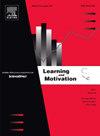Why does a self-learning environment matter? Motivational support of teachers and peers, enjoyment and learning strategies
IF 1.7
4区 心理学
Q3 PSYCHOLOGY, BIOLOGICAL
引用次数: 0
Abstract
This study examines the influence of instructional environments on students' academic enjoyment, motivational support, and learning strategies within the framework of control-value theory. Addressing a gap in empirical research on rubric-guided self-learning (SL), the study explores how peer and teacher motivation interact with achievement emotions to shape learning outcomes. A sample of 1410 students in grades 7 and 8 participated, with SL environments incorporating competency rubrics compared to traditional teacher-centered settings. Multigroup structural equation modeling was used to test latent interactions of motivational support on students' enjoyment, effort, and control strategies. Results indicate that SL environments foster greater enjoyment than traditional learning, though the impact of peer motivation lessens as enjoyment increases in SL contexts. Notably, peer motivation played a more complex role in traditional classrooms, at times moderating the relationship between enjoyment and effort negatively. These findings suggest that SL environments may better support autonomous motivation by reducing reliance on peer influence, highlighting the benefits of self-regulated learning models that prioritize intrinsic motivation. This study provides practical insights for designing learning environments that enhance student enjoyment and engagement.
自学环境为何重要?教师和同伴的激励支持、乐趣和学习策略
本研究在控制价值理论的框架内,探讨了教学环境对学生的学习乐趣、动力支持和学习策略的影响。本研究针对评分标准指导下的自学(SL)实证研究中存在的空白,探讨了同伴和教师动机如何与成就情绪相互作用,从而影响学习结果。1410名七、八年级学生参与了这项研究,与传统的以教师为中心的自学环境相比,自学环境采用了能力评分标准。研究采用多组结构方程模型来检验激励支持对学生的乐趣、努力和控制策略的潜在相互作用。结果表明,与传统学习相比,可持续学习环境更能激发学生的学习乐趣,但随着可持续学习环境中学习乐趣的增加,同伴激励的影响也会减弱。值得注意的是,同伴激励在传统课堂中的作用更为复杂,有时会对快乐和努力之间的关系产生负面调节作用。这些研究结果表明,可持续学习环境可以通过减少对同伴影响的依赖,更好地支持自主学习动机,从而突出强调内在动机优先的自我调节学习模式的益处。这项研究为设计能提高学生乐趣和参与度的学习环境提供了实用的见解。
本文章由计算机程序翻译,如有差异,请以英文原文为准。
求助全文
约1分钟内获得全文
求助全文
来源期刊

Learning and Motivation
Multiple-
CiteScore
2.90
自引率
0.00%
发文量
53
期刊介绍:
Learning and Motivation features original experimental research devoted to the analysis of basic phenomena and mechanisms of learning, memory, and motivation. These studies, involving either animal or human subjects, examine behavioral, biological, and evolutionary influences on the learning and motivation processes, and often report on an integrated series of experiments that advance knowledge in this field. Theoretical papers and shorter reports are also considered.
 求助内容:
求助内容: 应助结果提醒方式:
应助结果提醒方式:


